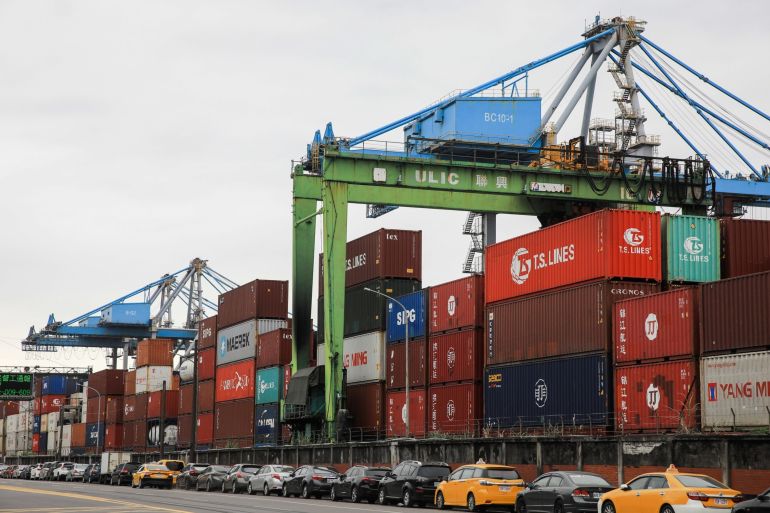Taiwan may get economic deal with US after exclusion from IPEF
Economic agreement similar to new IPEF would underline US commitment to self-ruled democracy, analysts say.

Taipei, Taiwan – The United States and Taiwan are reportedly working on a deal to enhance economic cooperation in areas like trade, agriculture and supply chains, after the self-ruled island was excluded from US President Joe Biden’s economic framework aimed at countering Chinese influence.
The proposed agreement would be similar to the US-led Indo-Pacific Economic Framework (IPEF), which Biden launched last week in Japan, according to Bloomberg, which first reported the deal, citing unnamed sources.
Keep reading
list of 4 itemsCuban dissident artists go on trial, face years in prison
Canada introduces new legislation to ‘freeze’ handgun ownership
EU leaders agree to Russian oil ban after compromise with Hungary
The IPEF is seen as a substitute for the Trans-Pacific Partnership, which former US President Donald Trump abandoned in 2017, and a key plank of the Biden administration’s strategy to enhance US engagement in the Asia-Pacific.
The framework aims to foster common standards in four broad areas – supply-chain resilience; clean energy and infrastructure; taxation and anti-corruption; and fair trade – but does not expand market access like a traditional free trade agreement.
The framework’s lack of tariff reductions has been met with disappointment in the region, where many export-reliant countries are seeking greater access to the US market.
Joanne Ou, spokesperson for Taiwan’s Ministry of Foreign Affairs, told Al Jazeera that Taiwan has yet to commit to any deal with the US but said “economic and trade relations between Taiwan and the United States have developed more closely” since Biden took office.
Ou said the two sides are due to meet again in the coming weeks following recent talks between US Trade Representative Katherine Tai and Taiwan’s Minister-Without-Portfolio John Deng, during which they agreed to deepen trade and investment.
In the lead-up to Biden’s trip to Asia, there was speculation that Taiwan could be included on the itinerary due to its globally important role in fields such as semiconductors and high-end manufacturing.
Although the IPEF is intended to counterbalance China’s growing clout in the Asia-Pacific, it is likely that some members are reluctant to include Taiwan for fear of upsetting China. Beijing claims the self-ruling democracy as a province that should be reunified with the mainland by force if necessary and has blocked its participation in most international organisations.
“Taiwan, as always, has a struggle. It is well-positioned to join a wide variety of trade arrangements, with a willingness to adjust domestic regulations and policies, if needed, to support trade commitments,” Deborah Elms, founder and director of the Asian Trade Centre in Singapore, told Al Jazeera.
“But it has an ongoing political structure that makes it extremely difficult for governments to launch talks with Taiwan.”
A less formal bilateral deal, however, could still bring many of the benefits of the IPEF without the political headache, said Wen-ti Sun, a political scientist who teaches at Australian National University’s Taiwan Studies Program.
Sun described such a deal as a “tactful compromise” that would also avoid the political hurdles in the US of a formal free trade agreement (FTA), which would require the approval of the US Congress.
“A US-Taiwan trade deal, if signed, will likely manifest in more flexible forms, such as a MOU [Memorandum of Understanding], or a looser framework agreement, that have much of the political force but less of the political hurdles of a full-fledged FTA,” he told Al Jazeera.
The IPEF currently has 13 members apart from the US: Australia, Brunei, India, Indonesia, Japan, South Korea, Malaysia, New Zealand, the Philippines, Singapore, Thailand, Vietnam and Fiji.
While Taiwan has been left out of the IPEF for now, US officials have publicly indicated their desire for deepened economic ties.
White House National Security Adviser Jake Sullivan said last week the US wants to collaborate on “high-technology issues, including on semiconductors and supply chains”, although only on a “bilateral basis” for now.
Closer trade links are also considered a way of deterring China from attacking Taiwan, said Nick Marro, a Taiwan analyst at the Economist Intelligence Unit, who described the existing US-Taiwan relationship as “robust”.
“The biggest significance out of all of this is political. Any move by the US to deepen its engagement with Taiwan, even if it is being framed as unofficial, is sending a signal, and that signal is that the US and Taiwan are looking to expand their de-facto relationship,” Marro told Al Jazeera.
“That is going to strengthen the messaging that both Taiwan and the US can send to China around things like deterrence.”